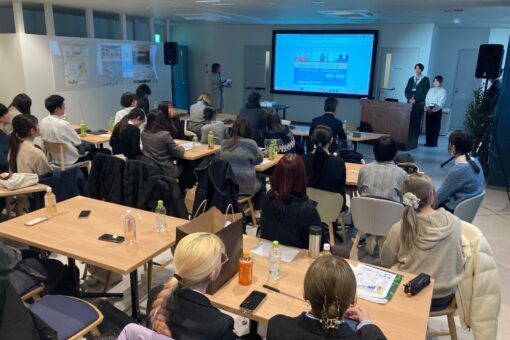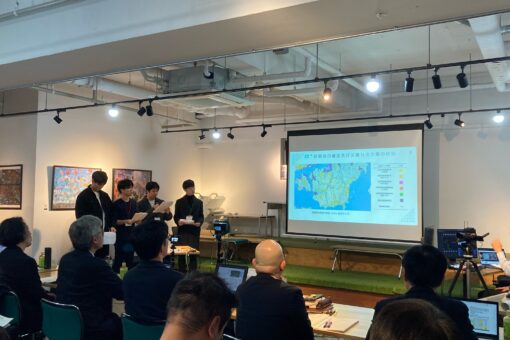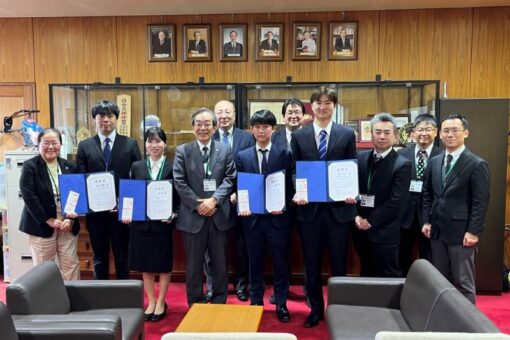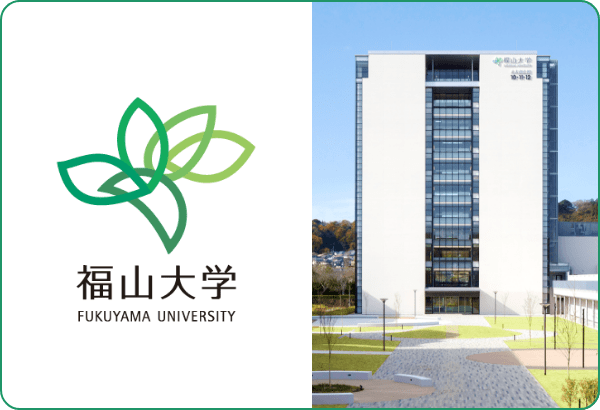【国際センター】Fukuyama University International Perspectives Conference Global Views of the Japanese Economy 福山大学国際的展望研究会 日本経済に対するグローバルな見方
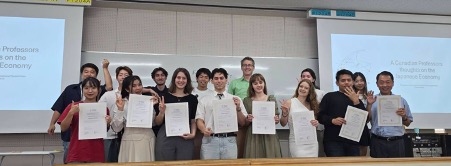

福山大学国際センターは、キャンパスの国際化を推進すると同時に、現在在籍する留学生や日本人学生に、グローバルな視点に立った研究や国際的なコラボレーションの機会を提供する方法を常に模索しています。この度、国際センターのイアン・ビセット副センター長(国際経済学科教授)は広島経済大学で交換留学中のクラクフ経済大学(ポーランド)のサラ・ピエトルシンスカさんから、学部生や大学院生を対象とした研究会の開催について打診を受けました。伊丹利明国際センター長(副学長)に相談したところ、センター長からも支援が表明されたことから、こうした催しの実現に向けて挑戦することに決めました。こうして、第1回福山大学国際的展望研究会の開催が企画されました。以下、ビセット教授からの寄稿を国際センターのFUKUDAI Mag担当の趙がお伝えします。
The International Center at Fukuyama University is always looking for ways that we can both continue to internationalize the campus as well as provide globally focused research and international collaboration opportunities for our current international and local students. Sara Pietrusinska, of the Krakow University of Economics, currently studying on exchange at the Hiroshima University of Economics, approached Fukuyama University International Center Deputy Director Ian Bisset, Professor, International Economics, about opportunities for undergraduate or graduate-level conferences in the area. After discussing with Vice President, and Director of the International Center Toshiaki Itami, who was very supportive and encouraging, it was decided to try and create such an event! Thus the 1st Fukuyama University International Perspectives Conference was planned .This report is by Zhao from the International Center .
We decided to start on a relatively small scale, with just one session: “Global Views on the Japanese Economy”. Sara liaised with her home University, the Krakow University of Economics, who kindly agreed to act as a conference partner. Sara recruited and arranged for 5 presenters and 4 audience members to take the highway bus northeast from Hiroshima City to our campus. Professor Tatsuji Hayakawa, Head of the International Economics Department, agreed to act as the keynote speaker, and Assistant Professor Cordelia Driussi of the University Education Center agreed to act as organizer from the Fukuyama University side. Associate Professor Zhao Jianhong of the International Center provided snacks and took pictures. Ms. Chin Shiki, a 3rd year student in the International Economics Department kindly picked up the visitors at the Hongo Highway bus stop and guided them to campus on a very hot day! In all, there were 16 participants made up of people from 10(!) different countries: Cambodia, Canada, China, France, Germany, Japan, Korea, Nepal, Poland, and the U.S.A.
今回の研究会は「日本経済に対するグローバルな見方」というテーマで、1セッションのみの比較的小規模でスタートすることに決めました。サラさんには母校の大学と連絡を取り、会議のパートナーとして協力することを快諾してもらいました。また、5人のプレゼンターと4人の聴衆を募り、広島市内から北東方面行きの高速バスで本学まで移動する手配もしてもらいました。国際経済学科の早川達二教授が基調講演者となることを引き受け、大学教育センターのコーデリア・ドリュッシー助教が福山大学側のオーガナイザーを引き受けました。研究会当日、国際センターの趙建紅准教授も写真撮影等、手伝いに来てくれました。国際経済学科3年生の陳思琦さんは、暑い中、本郷の高速バス停でみんなを出迎え、キャンパスまで案内してくれました。カンボジア、カナダ、中国、フランス、ドイツ、日本、韓国、ネパール、ポーランド、アメリカと、計10か国から16名の参加者が集まりました。

Professor Bisset opened the conference with his views on the Japanese Economy. He explained first, why Japan is still considered “cool”, before talking about both the headwinds that Japan faces and signs of optimism for the future.
研究会の冒頭ではビセット教授が日本経済について自身の見解を述べました。なぜ日本が依然として「クール」だと思われているのか、さらに日本が直面している逆風と将来への楽観的な兆しの両方について分析しました。

In the macro economy, the weak yen has left the Bank of Japan with a difficult situation between a rock (low interest rates, weakening yen) and a hard place (raising interest rates to protect the yen but causing pain to the economy at large). In management, a 2018 paper by three Tokyo University of Technology scholars identified a persistent problem in the management style of many Japanese firms using the “Quiet Life Hypothesis” (Ikeda, Inoue, & Watanabe, 2018). Basically, the lingering issue of older, entrenched managers in Japan “who would rather preside comfortably over declining little empires than embrace new technologies and business models and take new risks.” (Smith, 2023)
Ikeda, N., Inoue, K., & Watanabe, S. (2018). Enjoying the quiet life: Corporate decision-making by entrenched managers. Journal of the Japanese and International Economies, 55-69.
Smith, N. (2023). Actually, Japan has changed a lot. From Noahpinion: https://www.noahpinion.blog/p/actually-japan-has-changed-a-lot
ビセット教授によると、マクロ経済では、円安によって日銀は岩盤(低金利、円安)と岩盤の間の難しい状況(円を守るために金利を上げるが、経済全体に痛みを与える)に置かれています。また経営に関して、ビセット教授は東京工業大学の3人の研究者による2018年の論文に見られる「平穏な生活追求仮説」(Ikeda, N., Inoue, K., & Watanabe, S. 2018)を用いて、多くの日本企業の経営スタイルに根強い問題があることを指摘しました。それはすなわち「新しい技術やビジネスモデルを取り入れたり、新しいリスクを取るよりも、衰退しつつある小さな帝国を安穏と見守ることを好む」 (Smith, 2023)という日本の高齢で凝り固まった経営者のなかなか消えそうにない問題だといいます。
But this pessimism was countered by two thoughts of optimism. The efficiency of the Japanese housing market causes housing to be much more affordable in Japan than in other highly developed countries. He also noted the recent Japan External Trade Organization focus on attracting Foreign Direct Investment (FDI) and the soaring inbound capital investment related to semiconductors (JETRO, 2023).
JETRO. (2023). JETRO Invest Japan Report 2023. Japan External Trade Organization: https://www.jetro.go.jp/en/invest/investment_environment/ijre/report2023/
一方、こうした悲観論に対して二つの楽観論もあります。日本の住宅市場が効率的であるため、他の先進国に比べて住宅価格がはるかに手頃であること、また、日本貿易振興機構(JETRO)が外国直接投資(FDI)の誘致に力を入れていることや、半導体関連の設備投資が急増していること (JETRO, 2023)にもビセット教授は言及しました。
This was followed by a general discussion as we enjoyed lunch sponsored by Vice President Itami.
Then the breakout session of undergraduate and graduate student presentations began and are listed as follows:
その後、伊丹国際センター長主催の昼食会を挟んで、全体討議が行われました。

学部生と大学院生の分科会風景
Clockwise from Top Left:
Sara Pietrusinska (Poland), of the Krakow University of Economics (Undergraduate): “The corner store of the future: how 7-Eleven shapes Japan’s economy”
Katarzyna Kalemba (Poland), of the Krakow University of Economics (Undergraduate): “Tourism in Japan and its impact on the Japanese Economy”
Eren Nehmet Kaya (Germany), of Pforzheim University (Undergraduate): “Japan’s aging society”
Pratap Gurang (Nepal) of Fukuyama University (Undergraduate): “Insights on the Japanese economy on the basis of personal experience”
Lea Salvadori (France), of SKEMA Business School (Graduate): “The lost decade as a catalyst for urban transformation”
Lao Sokkeang (Cambodia), of Pannyassastra University (Undergraduate): “Japanese consumer culture and its economic impact”
学部生と大学院生の分科会風景。左上から時計回りに
Sara Pietrusinska(ポーランド)クラクフ経済大学(大学生): 「未来のコーナーストア:セブンイレブンはいかに日本経済を形成しているか」
Katarzyna Kalemba(ポーランド)、クラクフ経済大学(大学生): 「日本における観光と日本経済への影響」
Eren Nehmet Kaya (ドイツ), プフォルツハイム大学 (大学生): 「日本の高齢化社会」
Pratap Gurang(ネパール)福山大学(大学生): 「個人的経験に基づく日本経済への洞察」
Lea Salvadori(フランス)SKEMAビジネススクール(大学院生): 「都市変革の触媒として失われた10年」
Lao Sokkeang(カンボジア)、パンニャサストラ大学(大学生): 「日本の消費文化とその経済的影響」
After these 6 excellent presentations we were privileged to hear Professor Hayakawa talk about his view of our view of the Japanese economy.
He noted that while tourism in Japan is a very positive development, he sees over-tourism as a slight concern. This is true elsewhere as well, there was a protest regarding this issue in Spain recently. The bus situation in Kyoto is worrisome, and he has heard of over-tourism in Miyajima especially on weekends. Japan may need to come up with some solutions before it is too late.
これら6つの素晴らしいプレゼンテーションの後、日本経済に関する早川教授の見方を伺うことができました。
早川教授は、日本の観光は非常にポジティブな発展である一方、過剰な観光は若干の懸念材料であると指摘。これは他の国でも同様で、最近スペインでも抗議デモがありました。京都のバス事情は心配ですし、宮島では特に週末に観光客が増えすぎているという話も聞きます。日本は手遅れになる前に、何らかの解決策を打ち出す必要があるでしょう。
A few of the students mentioned “language barrier” as a challenge in Japan. Professor Hayakawa agreed with the point. It is making Japan relatively more difficult to adjust in terms of studying and working. The fact that Japan often struggles with inviting incoming foreign direct investment is also related to this issue, so there is an economic cost, too.
日本での課題として「言葉の壁」を挙げる学生が何人かいました。早川教授もその指摘に同意。言葉の壁があることで、日本は留学や就職の面で適応するのが相対的に難しくなっています。日本が海外からの直接投資の誘致に苦戦することが多いのもこの問題と関係しており、当然コストもかかるといいます。
Professor Hayakawa’s comment: “My overall impression of the speakers is very positive. Students took time and effort to come up with their presentations. In some cases, I expected more clarity on the issue, but overall, I enjoyed the presentation and thank all of them for their contributions.”
早川教授のコメント 「発表者に対する全体的な印象は、とてもポジティブなものです。皆さんは時間と労力をかけてプレゼンテーションを考えてくれました。いくつかのケースでは、問題について今後より明確になることを期待します。全体として、私はプレゼンテーションをとても楽しみました。皆さんの貢献に感謝します。」
And in the Q&A session Professor Hayakaya noted that despite Japan’s real estate sector being more affordable than elsewhere that there are still some issues: specifically about families holding on to empty houses, even when they become dangerous and unlivable, which can be a metaphor for the aging population and also the aging economy.
Finally he spoke passionately about language barriers. A trilingual (Japanese, Spanish, and English) native of Japan, he noted that these communication obstacles with all other countries slow down Japanese progress, both internationally and domestically – if Japan wants an international labor force to repopulate the younger generations, Japanese people need to learn at least one other language than Japanese.
早川教授はまた、空き家が危険で住めなくなってもなお家族がそこに住み続けることは、高齢化社会と高齢化経済のメタファーと言えるだろうと指摘しました。
最後に、早川教授は言葉の壁について熱く語りました。日本語、スペイン語、英語のトリリンガルである彼は、他のすべての国とのコミュニケーションの障害が、国際的にも国内的にも日本の進歩を遅らせていると指摘しました。

After the conference, we were joined by many of GCC members and we all climbed up Senkoji mountain and watched the Onomichi fireworks from the park beside the Onomichi city art museum. We are hopeful that we can make this an annual tradition!
研究会終了後、学内の英語コミュニケーションクラブGCC (Global Communication Club)メンバーと一緒に千光寺山に登り、尾道市立美術館横の公園から尾道の花火を見ました。私達はこの催しが毎年の恒例行事として続けられるよう期待しています!


学長から一言:早川教授、ビセット教授、ドリュッシー助教の尽力もあって、日頃は本学のグローバルラウンジで行われている留学生と日本人学生との交流活動が新たな展開を見せたようです。他大学の留学生と一緒になって、さまざまな問題を議論する研究会の立ち上げを心から慶びたいと思います。
Words from the President: Thanks to the efforts of Professor Hayakawa, Professor Bisset, and Assistant Professor Driussi, the exchange activities between international and Japanese students, which are usually held in the Global Lounge of our university, seem to have taken a new turn. I would like to congratulate the kick-off of a conference where international students from other universities can get together with ours and discuss various issues.
